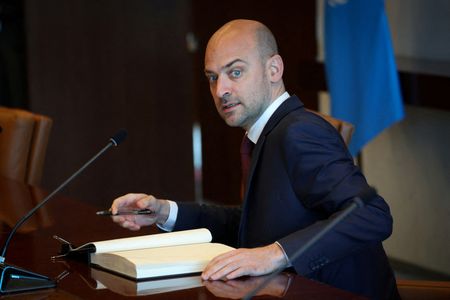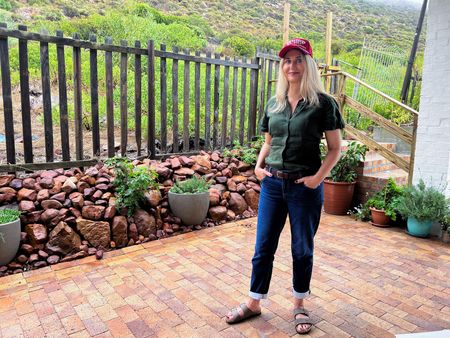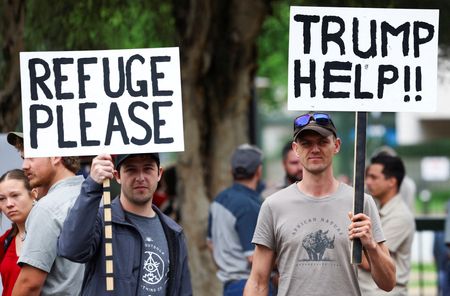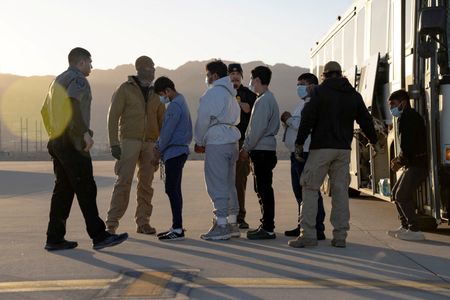By Tim Cocks and Shafiek Tassiem
JOHANNESBURG (Reuters) – The first 49 white South Africans granted refugee status for being deemed victims of racial discrimination under an offer by U.S. President Donald Trump were flying to the U.S. on Monday.
Under Trump, Washington has blocked mostly non-white refugee admissions from the rest of the world but is prioritising Afrikaners, the descendants of mostly Dutch settlers.
Treating white South Africans as refugees fleeing oppression has drawn a mixture of alarm and ridicule by South African authorities, who say the Trump administration has waded into a domestic issue it does not understand.
South African media, too, have shown little sympathy for the asylum seekers, with many keeping them off front pages and calling them “refugees” in quotation marks.
The charter plane carrying the 49 from Johannesburg was due into Washington Dulles airport at around 12:30 (1630 GMT). People familiar with the matter said the South Africans would participate in a press conference before boarding flights to different U.S. destinations.
Some were heading to Democratic-leaning Minnesota, which has a reputation for welcoming refugees, while others planned to go to Republican-led states such as Idaho and Alabama, sources told Reuters.
South Africa maintains there is no evidence of persecution.
‘WRONG END OF THE STICK’?
Speaking at a conference in Ivory Coast, President Cyril Ramaphosa said the white South Africans had ostensibly left because they were opposed to policies aimed at addressing racial inequality persisting since apartheid.
“We think that the American government has got the wrong end of the stick here, but we’ll continue talking to them,” he said.
People interviewed by Reuters in Cape Town on Monday said they bore no ill will to their departing compatriots but doubted they would find life much better in the U.S.
“I don’t believe in running away from problems, you know, we’ve got a lovely country, and we make it work,” said Robert Skeen, a 47-year-old Afrikaner selling boerewors rolls, the South African equivalent of a hot dog.
“We’re really blessed in South Africa, … with all the drama going on, it’s still one of the best countries in the world to live in.”
Since Nelson Mandela brought democracy into South Africa in the 1994, the once-ruling white minority has retained most of their wealth amassed since colonial times.
Whites still own three-quarters of private land and have about 20 times the wealth of the Black majority, according to international academic journal the Review of Political Economy.
Less than 10% of white South Africans are out of work, compared with more than a third of their Black counterparts.
RIGHT-WING TROPE
Yet the claim that minority white South Africans face discrimination from the Black majority has become an established trope in right-wing online chatrooms, and been echoed by Trump’s white South African-born ally Elon Musk.
Three white South Africans who had first-round interviews at the U.S. embassy in Pretoria told Reuters that officials asked questions about their experiences with land disputes, crime and perceived racial discrimination.
Ramaphosa signed a law this year that aims to make it easier for the state to expropriate land in the public interest, which has caused concern among some white South Africans although no land has been seized.
Since his return to the White House in January, Trump has cut all U.S. financial assistance to South Africa, citing disapproval of its land policy and of its genocide case at the International Court of Justice against Washington’s ally Israel.
A spokesperson for the U.S. Department of Health and Human Services said on Friday that it was working with the State Department to support the South Africans’ resettlement, without giving details about what kind of assistance they would receive.
The spokesperson added that more arrivals were expected in the coming months. The State Department paid for Monday’s charter flight, according to someone familiar with the matter.
(Reporting by Tim Cocks and Shafiek Tassiem; Additional reporting by Sfundo Parakozov, Catherine Schenck, Anait Miridzhanian, Nilutpal Timsina, Ted Hesson and Nellie Peyton; Editing by Andrew Cawthorne)






